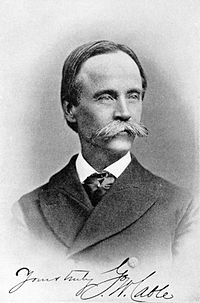- George Washington Cable
-
George Washington Cable (October 12, 1844 – January 31, 1925) was an American novelist notable for the realism of his portrayals of Creole life in his native Louisiana. His fiction has been thought to anticipate that of William Faulkner.
Contents
Biography
Cable was born in New Orleans, Louisiana. He served in the Confederate Army during the American Civil War. At the end of the war in 1865, he went into journalism, writing for the New Orleans Picayune, where he would remain through 1879. By that time, he was a well established writer. His sympathy for civil rights and opposition towards the harsh racism of the era showed in his writings, earning him resentment by many white Southerners. His dealing with racism in his writing is said to influence William Faulkner and Robert Penn Warren. In 1884, Cable moved to Massachusetts. He became friends with Mark Twain, and the two writers did speaking tours together. Despite his dark, '"indelicate" depictions of society, Twain once said of Cable that "when it comes down to moral honesty, limpid impotence, and utterly blameless piety, the Apostles were mere policemen [compared] to Cable" (1). Cable died in St. Petersburg, Florida.
Quotation
 Sketch of Cable in 1905
Sketch of Cable in 1905"The party had the privilege of idling through this ancient quarter of New Orleans with the South's finest literary genius, the author of "the Grandissimes." In him the South has found a masterly delineator of its interior life and its history. In truth, I find by experience, that the untrained eye and vacant mind can inspect it and learn of it and judge of it more clearly and profitably in his books than by personal contact with it.
With Mr. Cable along to see for you, and describe and explain and illuminate, a jog through that old quarter is a vivid pleasure. And you have a vivid sense as of unseen or dimly seen things—vivid, and yet fitful and darkling; you glimpse salient features, but lose the fine shades or catch them imperfectly through the vision of the imagination: a case, as it were, of ignorant near-sighted stranger traversing the rim of wide vague horizons of Alps with an inspired and enlightened long-sighted native." from Mark Twain's Life on the Mississippi
Works
- His most important works are Old Creole Days, The Grandissimes, and Madame Delphine.
- The Grandissimes is a historical romance set in New Orleans shortly after the Louisiana Purchase. The plot follows the adventures and romances of several members of the Grandissime family, a French-American creole family, many of whom are mixed-race (white, African, and Native American). (1)http://docsouth.unc.edu/southlit/cablegrand/summary.html
- In 1880, the United States Census Bureau commissioned Cable to write a "historical sketch" of pre-Civil War New Orleans for a special section of the 10th United States census' "Social statistics of cities". His work later was revised as "Creoles of Louisiana". In 2008 his work was published as The New Orleans of George Washington Cable. This most recent revision includes all of Cable's footnotes and research that were omitted by editors from its original publication.
External links
- Cable resources page at American Authors (formerly on Gonzaga site)
- Brief biography of Cable from the 'Encyclopedia of Southern Culture', hosted at Documenting the American South
- Works by George Washington Cable at Project Gutenberg
Sources
1. McMichael, George and et al. Anthology of American Literature. vol 2. Upper Saddle River, New Jersey: Pearson Education, 2007. p. 483.
Categories:- 1844 births
- 1925 deaths
- American novelists
- Writers from Louisiana
- People from New Orleans, Louisiana
- Mark Twain
Wikimedia Foundation. 2010.

